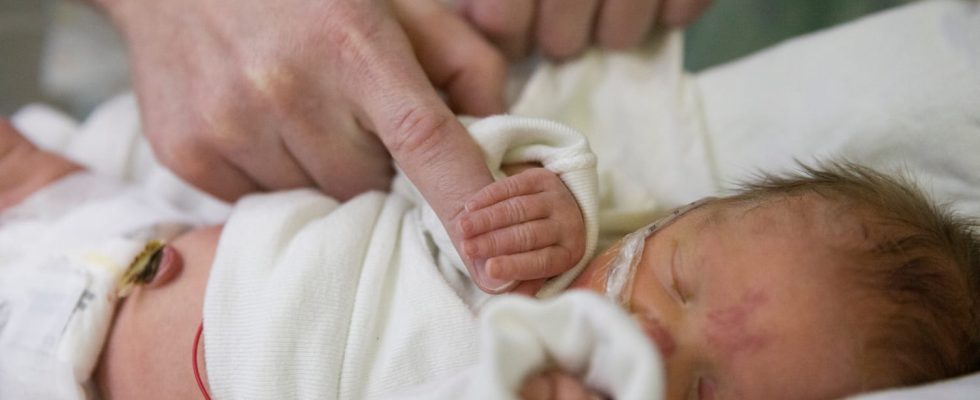Necrotizing enterocolitis is a digestive pathology characterized by more or less pronounced necrosis of the intestinal mucosa. It represents the most common gastrointestinal emergency in newborns.
Definition: what is enterocolitis?
Necrotizing enterocolitis is a digestive disease characterized by inflammation of the small intestine and colon, associated with more or less significant necrosis of the intestinal mucosa. This pathology mainly affects newborns during their first weeks of life, especially in cases of prematurity or serious illness. Necrotizing enterocolitis represents the most common gastrointestinal emergency in newborns. An abdominal x-ray is performed to confirm the diagnosis.
Up to what age can you be affected? Possible in adults?
“We rarely talk about necrotizing enterocolitis after the age of 1 year. This pathology therefore does not affect adults., indicates Dr Raphaëlle Maudinas, gastro-pediatric allergist at Dijon University Hospital. On the other hand, simple enterocolitis, that is to say inflammation of the small intestine and colon, can occur in adulthood, in which case it will be of bacterial, viral, parasitic or inflammatory origin.
What are the symptoms ?
Necrotizing enterocolitis is manifested by:
- A change in behavior of the newborn which becomes whiny, irritable
- A refusal to eat
- A hard, swollen abdomen
- Repeated vomiting
- The presence of blood in the stools
- An apathetic state: because of the pain, the newborn may feel unwell or even go into shock.
What are the causes ?
In 90% of cases, necrotizing enterocolitis occurs in vulnerable newborns: “either premature babies or children with a digestive malformationan abnormality in the intestine such as atresia, malrotation or strangulation (volvulus)“, explains the gastro-pediatrician. In addition to prematurity, other risk factors exist: low weight for gestational age (PAG), an infant milk diet which does not protect the intestinal mucosa like breast milk, anemiathe excess presence of certain bacteria in the intestine or even perinatal asphyxia, responsible for a decrease in the oxygen level in the newborn’s blood. “Furthermore, the triggering factor for necrotizing enterocolitis can be infectious (viral or bacterial infection), allergic or vascular. Immaturity of the intestine and poor blood supply to the intestine would also favor the occurrence of these lesions.“, she continues.
What are the treatments to treat it?
“Necrotizing enterocolitis is a severe illness which necessarily justifies hospitalization and sometimes even a stay in intensive care. The treatment is based on emptying the newborn’s stomach by inserting a nasogastric tube. An IV is then placed to administer antibiotics to the newborn, rehydrate him and feed him“, explains Dr Raphaëlle Maudinas. In certain cases, the digestive suffering of the newborn is such that it is essential to fast to rest the digestive system which is very damaged. In the final stage of necrotizing enterocolitis, a surgery may prove necessary. It then consists of resect diseased intestine.
“The newborn is then refed with milk which does not contain cow’s milk proteins because even if the cause is not necessarily allergic, an intestine that has suffered is more at risk of developing an allergy to cow’s milk proteins subsequently“, specifies the specialist. And for good reason, the intestinal mucosa is so permeable that milk proteins will pass through, which can constitute a source of secondary allergy.
What is the prognosis?
We think that 70 to 80% of newborns with necrotizing enterocolitis survive. “Recovery is satisfactory if newborns are cared for in a suitable department, their digestive system is rested and they are rehydrated. Healing may require several days to several weeks“, reassures our interlocutor.
Thanks to Dr Raphaëlle Maudinas, gastro-pediatric allergist at Dijon University Hospital
